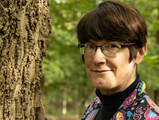I recently ingested a writing book by Chuck Palahniuk (Fight Club), Consider This. It had some excellent writing tips despite extensive name-dropping and life-as-a-famous-author-is-hard grumbling.
My take-aways:
My take-aways:
| "A book will only become a classic if it binds together a community of readers. …To create this community, give readers more than they can handle alone. Give them so much humor or pathos or idea or profundity that they’re compelled to push the book on others if only to have peers with whom they can discuss it. Give them a book so strong, or a performance so big, that it becomes a story they tell." |
AUTHORITY.
"Action carries its own authority. If you move through each scene with clear, physical verbs→taking steps, touching objects→your reader’s mind will follow as closely as a dog’s eyes track a squirrel."
"Stories have greater authority if they’re delivered with the same passion and flawed language that an actual person would use telling the emotion-laden truth."
"Action carries its own authority. If you move through each scene with clear, physical verbs→taking steps, touching objects→your reader’s mind will follow as closely as a dog’s eyes track a squirrel."
"Stories have greater authority if they’re delivered with the same passion and flawed language that an actual person would use telling the emotion-laden truth."
DIALOGUE.
"Consider that when you put a character’s dialogue in quotes you give the character greater reality. …If you want to negate or lessen a character, paraphrase what they say. When you want to showcase a character, put their dialogue in quotation marks. Use attribution. Underscore each speech with a gesture."
"Consider that when you put a character’s dialogue in quotes you give the character greater reality. …If you want to negate or lessen a character, paraphrase what they say. When you want to showcase a character, put their dialogue in quotation marks. Use attribution. Underscore each speech with a gesture."
TENSION.
"A good [ticking] clock limits time, thus heightening tension. And it tells us what to expect, thus freeing our minds to indulge in the emotion of the story."
"...by introducing limited elements, and doing so early, the Minimalist writer is free to aggressively move the plot forward. And the limited number of elements→characters, objects, settings→accrue meaning and importance as they’re used repeatedly."
"A good [ticking] clock limits time, thus heightening tension. And it tells us what to expect, thus freeing our minds to indulge in the emotion of the story."
"...by introducing limited elements, and doing so early, the Minimalist writer is free to aggressively move the plot forward. And the limited number of elements→characters, objects, settings→accrue meaning and importance as they’re used repeatedly."
More favorite quotes:
- Avoid making your reader feel foolish at all costs! You want to make your reader feel smart, smarter than the main character. That way the reader will sympathize and want to root for the character.
- The job of a creative person is to recognize and express things for others. …The best writers seem to read our minds, and they nail exactly what we’ve never been able to put into words.
- Find some way to love every aspect of the writing job.
- You never dictate meaning to your reader. If need be, misdirect [her.] But always allow [her] to realize the truth before you state it outright. Trust your readers’ intelligence and intuition, and they will return the favor.
- Tell your stories not simply through your readers’ eyes and minds, but through their skin, their noses, their guts, the bottoms of their feet.
- A character’s mistakes or misdeeds allow the reader to feel smarter. The reader becomes the caretaker or parent of the character and wants the character to survive and succeed.. ...establish emotional authority by depicting an imperfect character making a mistake.
- A good writer must gently pass the reader from sentence to sentence, like a fragile egg, without jarring the reader out of the story.
- Build your novel with a number of scenes or chapters that can stand alone as short stories. …Self-contained, a story can also be sold to a magazine, for extra money and to assure some future book publisher that the topic has already been embraced by other editors.


 RSS Feed
RSS Feed